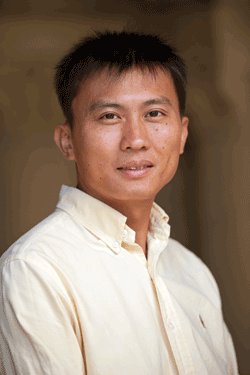Yi Cui
2017 National Award Winner — Faculty

Current Position:
Professor of Materials Science and Engineering; Professor, Photon Science Directorate, SLAC; Professor (By courtesy), Chemistry
Institution:
Stanford University, Stanford Linear Accelerator Center (SLAC)
Discipline:
Materials Science & Nanotechnology
Recognized for: Fundamental advances in the synthesis and fabrication of nanomaterials, and the development of highly innovative technologies using nanomaterials in batteries, solar cells, environmental technologies and beyond.
Biography:
Ph.D., Chemistry, Harvard University
B.S., Chemistry, University of Science and Technology of China
Prof. Cui is an authority in the design of nanoscale materials and their implementation in a wide variety of existing and novel technologies. His group studies the fundamental properties of nanomaterials and develops innovative methods and technologies to create and use them to address real-world challenges.
Prof. Cui’s group has used the nanomaterials that they have developed to drive increases in the performance of an array of modern devices, whilst also pioneering entirely new approaches to use them to tackle the energy crisis, environmental and biological issues, including:
Energy storage devices such as lithium ion batteries and supercapacitors, with notable advances in performance such as 10 times higher charge capacity using silicon nanowire anodes for lithium ion batteries than previously used carbon anodes.
Energy generation devices such as solar cells, where the group is designing materials and processing techniques to cut the costs of large-scale manufacturing. Energy conversion efficiency increases are achieved by incorporating nanomaterials into all parts of the cell from the energy-collecting layer to the electrodes.
Printable energy and electronic devices including ultracapacitors, batteries, water filtration, microbial fuel cells and printed electronics.
Optical probes to see inside biological cells and nanoscale guides for the growth of neuronal networks for nanobiotechnological applications.
“My goal is to generate breakthrough energy and environmental technologies that can change the world, to commercialize these technologies to make a real impact on society, and to mentor many outstanding students who will develop high-impact technologies throughout their careers.”
Key Publications:
- Chan C.K., Peng H., Liu G., McIlwrath K., Zhang X.F., Huggins R.A., Cui Y. High Performance Lithium Battery Anodes Using Silicon Nanowires. Nature Nanotechnology. 2008.
- Lin D., Liu Y., Liang Z., Lee H.-W., Sun J., Wang H., Yan K., Xie J., and Cui Y. Layered reduced graphene oxide with nanoscale interlayer gaps as a stable host for lithium metal anodes. Nature Nanotechnology. 2016.
- Liu C. et al. Rapid water disinfection using vertically aligned MoS2 nanofilms and visible light. Nature Nanotechnology. 2016.
- Hsu P.-C., Song A.Y., Catrysse P.B., Liu C., Peng Y., Xie J., Fan S., and Cui Y. Radiative human body cooling by nanoporous polyethylene textile. Science. 2016.
Other Honors
2016 Materials Research Society Fellow
2016 Top 10 World Changing Technologies by Scientific American (Cooling Textiles)
2015 Inaugural Schlumberger Chemistry Lectureship, University of Cambridge
2015 Inorganic Chemistry Frontiers Award for Young Scientist
2015 Resonate Award for Sustainability
2015 Small Young Innovator Award
2015 Fellow of Royal Society of Chemistry
2015 MRS Fred Kavli Distinguished Lectureship in Nanoscience
2014 Inaugural Nano Energy Award
2014 Bau Family Awards in Inorganic Chemistry
2014 Top 10 World Changing Technologies by Scientific American (Thermal Batteries)
2014 No. 1 “Hottest Researchers of Today” in Materials Science (Thomas Reuters)
2013 The IUPAC Distinguished Award for Novel Materials and Synthesis
2011 Wilson Prize, Harvard University
2010 Sloan Research Fellowship
2010 Top 10 World Changing Technologies by Scientific American (Nano Waterfilter)
2004 World Top Young Innovator Award by Technology Review
In the Media:
Stanford researchers say extracting uranium from seawater could help nuclear power play a larger role in a carbon-free energy future, Stanford News, February 17, 2017
Nanowire-Coated Fabric Keeps You Warm So Your House Won’t Have To, Popular Science, January 12, 2015
Stanford engineers develop new air filter that could help Beijing residents breathe easily, Stanford News, February 18, 2015
Link to research website
The Cui Group
